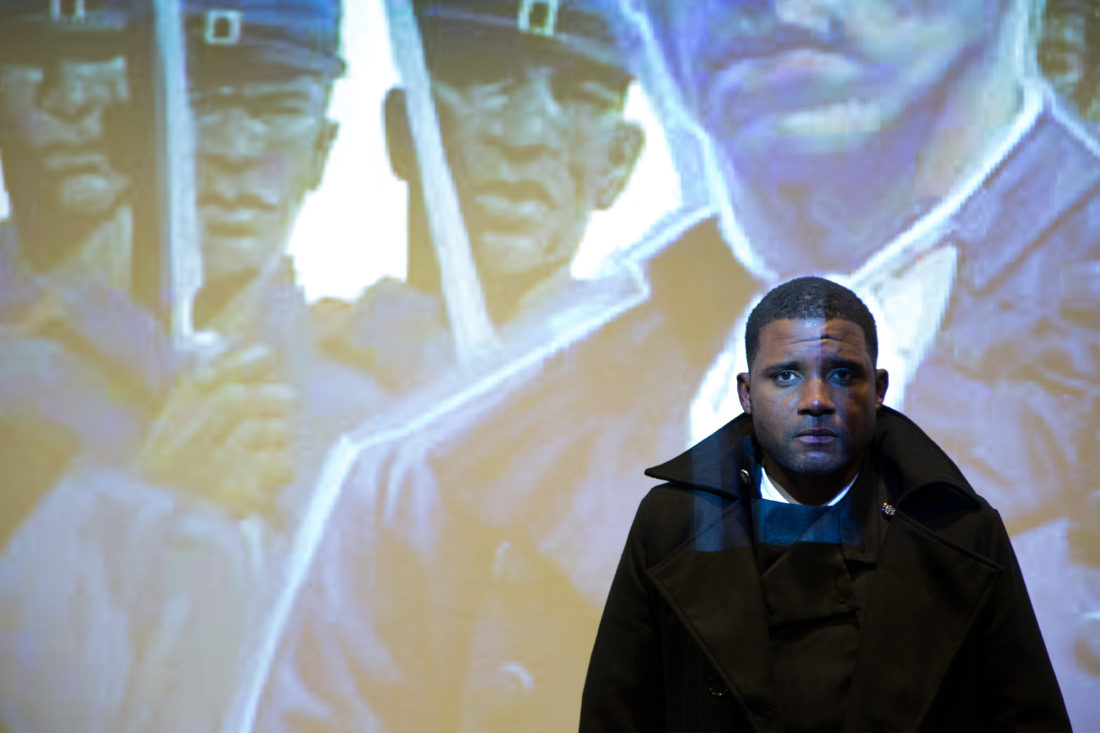N.C. Stage Company opens its 2019-20 season with The Fire of Freedom: The Story of Abraham Galloway, a historical production adapted for the stage by Howard Craft from David Cecelski’s book. Actor and playwright Mike Wiley, as Galloway, delivers a rousing one-man show on the life of the slave, spy, and N.C. senator. The production runs through Sunday, Oct. 6.
The stage is sparse, with two wooden chairs, a weathered trunk, a coat rack and a small table for a Bible and an apple. In the background, a screen displays photographs and other historical ephemera from the Civil War years. The set gives the audience a sense of the midnight meeting about to begin and enhances Wiley’s powerful storytelling.
The year is 1863. President Lincoln issued the Emancipation Proclamation in January, but now it’s spring. Not all slaves are free, and the Union can’t win the war without black men willing to fight.
Galloway addresses the audience directly. Calling us “brethren,” he speaks to a group of black men assembled in an attic on Mary Ann Starkey’s property in New Bern. Starkey, a free black woman who runs a boardinghouse, allies herself with Galloway. Everyone waits for Edward Kinsley to arrive from Massachusetts. A Union recruiter for the military, Kinsley hopes to convince black men in the area to join the Union effort and form “colored regiments.” Before Kinsley arrives, Galloway prepares the audience for what they will hear. His preamble serves as a cautionary tale about “the true inclination of white folks.”
Galloway reminds us that Lincoln would have preserved the Union without ending slavery if he could have. But that wasn’t possible. They can’t do it without us, he says. So many died at the whipping post, on the battlefield and in the trenches. Wiley lets the ghosts of the horrors Galloway has seen inhabit his face and his body. In a sense, the attic is haunted, and Galloway is a conjurer. The sound design reinforces the narrative with the crack of the whip, pops of gunfire and water lapping against a boat.
Through Galloway, we relive parts of the despair and suffering that constitute both slavery and freedom. He bears witness for the black men crowded in the attic. Behind him, blood splatters across the screen when a 14-year-old black child is tortured and killed for spying on Confederate troops. Galloway brandishes his gun and his knife and says, “No enslaved people talked their way out of bondage.”
At Vicksburg, Confederate troops captured and beat Galloway. With the help of another black captive named Isaac, a fight breaks out, gunfire erupts, and the chase is on. Wiley is riveting during this part of the story as he runs, falls, carries an injured man and, ultimately, must save himself. The wrenching choices during wartime, none without consequences, are etched on his face.
Because Galloway makes his appeal directly, we get to consider the stakes through the eyes and ears of a black audience at that time and place. The final photograph behind Galloway, at the end of the show, and the text that follows, reveal the results. Ultimately, each person has to decide what they would sacrifice for freedom.
WHAT: The Fire of Freedom: The Story of Abraham Galloway
WHERE: N.C. Stage Company, 15 Stage Lane, ncstage.org
WHEN: Through Sunday, Oct. 6. Wednesdays-Saturdays at 7:30 p.m. and Saturdays and Sundays at 2 p.m. Each performance concludes with a post-show discussion with Wiley. $26-$40 general/$10 for students




Before you comment
The comments section is here to provide a platform for civil dialogue on the issues we face together as a local community. Xpress is committed to offering this platform for all voices, but when the tone of the discussion gets nasty or strays off topic, we believe many people choose not to participate. Xpress editors are determined to moderate comments to ensure a constructive interchange is maintained. All comments judged not to be in keeping with the spirit of civil discourse will be removed and repeat violators will be banned. See here for our terms of service. Thank you for being part of this effort to promote respectful discussion.